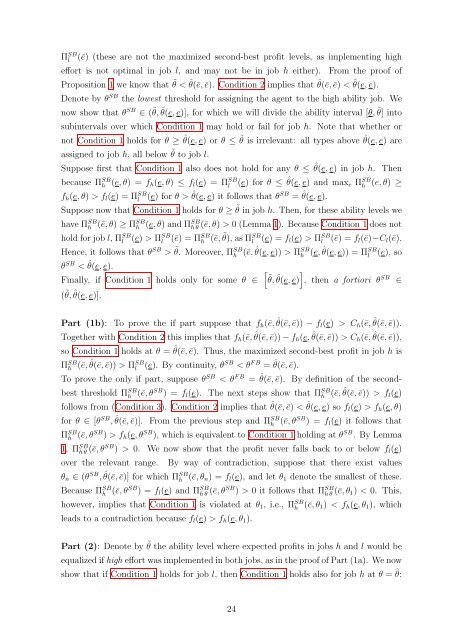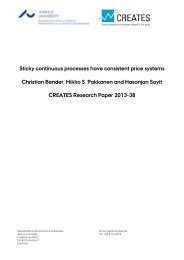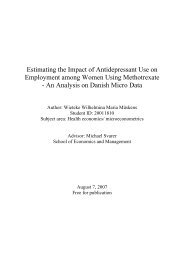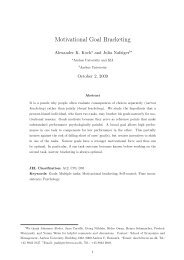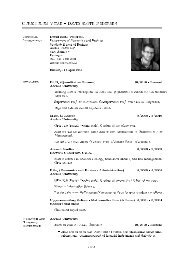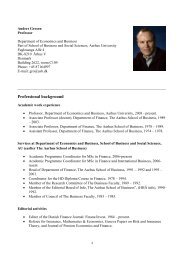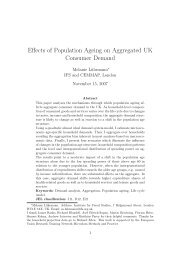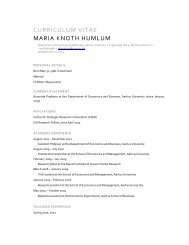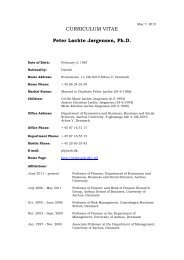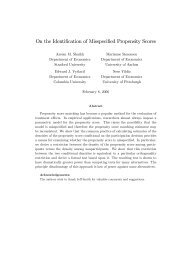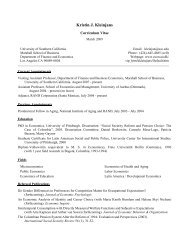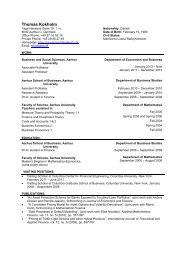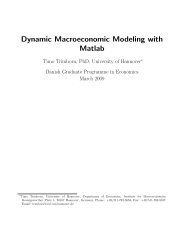Job Assignments under Moral Hazard - School of Economics and ...
Job Assignments under Moral Hazard - School of Economics and ...
Job Assignments under Moral Hazard - School of Economics and ...
Create successful ePaper yourself
Turn your PDF publications into a flip-book with our unique Google optimized e-Paper software.
Π SB<br />
l (ē) (these are not the maximized second-best pr<strong>of</strong>it levels, as implementing high<br />
effort is not optimal in job l, <strong>and</strong> may not be in job h either). From the pro<strong>of</strong> <strong>of</strong><br />
Proposition 1 we know that ˜ θ < ˆ θ(ē, ē). Condition 2 implies that ˆ θ(ē, ē) < ˆ θ(e, e).<br />
Denote by θ SB the lowest threshold for assigning the agent to the high ability job. We<br />
now show that θ SB ∈ ( ˜ θ, ˆ θ(e, e)], for which we will divide the ability interval [θ, ¯ θ] into<br />
subintervals over which Condition 1 may hold or fail for job h. Note that whether or<br />
not Condition 1 holds for θ ≥ ˆ θ(e, e) or θ ≤ ˜ θ is irrelevant: all types above ˆ θ(e, e) are<br />
assigned to job h, all below ˜ θ to job l.<br />
Suppose first that Condition 1 also does not hold for any θ ≤ ˆ θ(e, e) in job h. Then<br />
because ΠSB h (e, θ) = fh(e, θ) ≤ fl(e) = ΠSB l (e) for θ ≤ ˆ θ(e, e) <strong>and</strong> maxe ΠSB h (e, θ) ≥<br />
fh(e, θ) > fl(e) = ΠSB l (e) for θ > ˆ θ(e, e) it follows that θSB = ˆ θ(e, e).<br />
Suppose now that Condition 1 holds for θ ≥ ˜ θ in job h. Then, for these ability levels we<br />
have Π SB<br />
h<br />
(ē, θ) ≥ ΠSB<br />
h<br />
(e, θ) <strong>and</strong> ΠSB h θ (ē, θ) > 0 (Lemma 1). Because Condition 1 does not<br />
hold for job l, ΠSB l (e) > ΠSB l (ē) = ΠSB h (ē, ˜ θ), as ΠSB l (e) = fl(e) > ΠSB l (ē) = fl(ē)−Cl(ē).<br />
Hence, it follows that θSB > ˜ θ. Moreover, ΠSB h (ē, ˆ θ(e, e)) > ΠSB h (e, ˆ θ(e, e)) = ΠSB l (e), so<br />
θ SB < ˆ θ(e, e).<br />
Finally, if Condition 1 holds only for some θ ∈<br />
( ˜ θ, ˆ θ(e, e)].<br />
<br />
˜θ, θ(e, ˆ e) , then a fortiori θSB ∈<br />
Part (1b): To prove the if part suppose that fh(ē, ˆ θ(ē, ē)) − fl(e) > Ch(ē, ˆ θ(ē, ē)).<br />
Together with Condition 2 this implies that fh(ē, ˆ θ(ē, ē)) − fh(e, ˆ θ(ē, ē)) > Ch(ē, ˆ θ(ē, ē)),<br />
so Condition 1 holds at θ = ˆ θ(ē, ē). Thus, the maximized second-best pr<strong>of</strong>it in job h is<br />
Π SB<br />
h (ē, ˆ θ(ē, ē)) > Π SB<br />
l (e). By continuity, θ SB < θ F B = ˆ θ(ē, ē).<br />
To prove the only if part, suppose θ SB < θ F B = ˆ θ(ē, ē). By definition <strong>of</strong> the second-<br />
best threshold Π SB<br />
h (ē, θSB ) = fl(e). The next steps show that Π SB<br />
h (ē, ˆ θ(ē, ē)) > fl(e)<br />
follows from (Condition 3). Condition 2 implies that ˆ θ(ē, ē) < ˆ θ(e, e) so fl(e) > fh(e, θ)<br />
for θ ∈ [θ SB , ˆ θ(ē, ē)]. From the previous step <strong>and</strong> Π SB<br />
h (ē, θSB ) = fl(e) it follows that<br />
Π SB<br />
h (ē, θSB ) > fh(e, θ SB ), which is equivalent to Condition 1 holding at θ SB . By Lemma<br />
1, Π SB<br />
h θ (ē, θSB ) > 0. We now show that the pr<strong>of</strong>it never falls back to or below fl(e)<br />
over the relevant range. By way <strong>of</strong> contradiction, suppose that there exist values<br />
θn ∈ (θSB , ˆ θ(ē, ē)] for which ΠSB h (ē, θn) = fl(e), <strong>and</strong> let θ1 denote the smallest <strong>of</strong> these.<br />
Because ΠSB h (ē, θSB ) = fl(e) <strong>and</strong> ΠSB h θ (ē, θSB ) > 0 it follows that ΠSB h θ (ē, θ1) < 0. This,<br />
however, implies that Condition 1 is violated at θ1, i.e., ΠSB h (ē, θ1) < fh(e, θ1), which<br />
leads to a contradiction because fl(e) > fh(e, θ1).<br />
Part (2): Denote by ˜ θ the ability level where expected pr<strong>of</strong>its in jobs h <strong>and</strong> l would be<br />
equalized if high effort was implemented in both jobs, as in the pro<strong>of</strong> <strong>of</strong> Part (1a). We now<br />
show that if Condition 1 holds for job l, then Condition 1 holds also for job h at θ = ˜ θ:<br />
24


